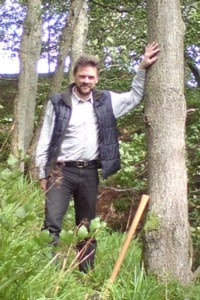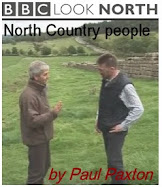 As an archaeologist in a dire state, I have decided to post an account of a recent discussion in the House of Lords about the dire state of British archaeology, international readers unfamiliar with the institution may find it interesting to see who contributes to such a debate . . . .
As an archaeologist in a dire state, I have decided to post an account of a recent discussion in the House of Lords about the dire state of British archaeology, international readers unfamiliar with the institution may find it interesting to see who contributes to such a debate . . . .On Monday afternoon the effects of the recession in the building industry on archaeology was raised in the House of Lords by the Liberal Democrat peer the Earl of Glasgow, eliciting a somewhat confused response from a government spokesman Lord Davies. In a House of Lords question he asked the government;
What steps they are taking to secure the future of
professional archaeology in the United Kingdom, and in particular to mitigate the effect on archaeologists of the recent contraction in the building industry.
In response the Government spokesman, Labour Peer Lord Davies, noted that the Institute of Archaeology recession seminar on February 16 had been attended by representatives of English Heritage and Department of Media Culture and Sport, and that the government was supporting a new national vocational qualification through English Heritage and the Heritage Lottery Fund, which would help develop skills and capacity in the long-term.
Patrick Boyle, the Earl of Glasgow, a title held by his family since 1703, then suggested that one fifth of the country’s 6500 archaeologists have already lost their jobs, and that some archaeological firms may have to cease trading. He asked whether the government was aware of the impact this might have on the nation’s heritage, as well as the long term effects of loosing “highly educated, but underpaid individuals” to other industries. He suggesting help should be offered to councils to support archaeology in planning departments, especially since such small sums of money would be involved.
Lord Davies, formerly Labour MP Bryan Davies, replied that the government was concerned, and conceded it must play a part in the preservation of the skill base, including architects, as well as other groups effected by the downturn in the building industry. But also reminded the house of the pressures on local authority spending, and state of the wider economy.
Former labour MP Alan Howarth, now Lord Howarth of Newport, then asked if, in addition to doing all they can to support archaeology, the house could be assured that the forthcoming planning policy statement on heritage and archaeology will not diminish existing protections for archaeology, and the role of archaeologists in the planning process .
Lord Davies stressed the government commitment to heritage, and in particular buildings, and the importance of public funding in this area, and the overall commitment to preserving skills such as architecture.
“Archaeology!” chorused the noble lords in response.
The Conservative Baroness Hooper then raised an interesting point about the training of marine archaeologists, and hoped their needs would be considered in any funding of workplace training and in the upcoming debate on the marine Bill. Lord Davies reassured the Baroness that all the issues in the marine bill will be discussed.
He then apologised to his fellow noble Lords for his slight slip in saying “architecture”, saying a recent meeting with a student, concerned about studying that subject, had left him with architecture as well as archaeology in my mind.
The Lord Bishop of Rochester asked whether the government continued to promote the work of British archaeologists abroad, especially in the Holy Land, and the Middle East generally. In response Lord Davies reminded the Lords of the threat to heritage posed by civil conflict in the region, which emphasised the importance of our own skill base.
Lord Walpole, Crossbench Peer, (independent), a descendant of the first ‘Prime Minister’ Sir Robert Walpole, suggested that the lack of rescue archaeology was an excellent opportunity redirect resources into some good some academic archaeology. Lord Davies, while acknowledging the opportunity existed, drew the attention of Lord Walpole to wider problems of University sector.
The former Liberal Democrat Spokesperson for Environment, Food and Rural Affairs, Lord Redesdale, has a degree in archaeology from Newcastle University, and is a board member of the York Archaeological trust, and he pointed out that a great deal of archaeological knowledge now resides in the private sector. He suggesting that that in the areas such as Roman Samian ware, for example, there was only one expert left. He hoped the government would take that into account especially when thinking about the establishment of historic record centres.
Lord Davies said the government would take his representation seriously, especially given Lord Redesdale’s considerable knowledge of this area.
The debate ended there. . . .
Source:
http://www.publications.parliament.uk/pa/ld/ldtoday/03.htm#hddr_1
See also
http://www.archaeologists.net/modules/icontent/index.php?page=219
http://paulbelford.blogspot.com/2009/02/ifa-recession-seminar.html
http://bajrblog.wordpress.com/2009/02/22/ifa-recession-seminar/


















3 comments:
Hi Geoff
It surprises me that a country so rich in history pays so little care about the preservation of it and the people who have taken the education to do this job. Today it is HMS Victory tomorrow who knows but certainly a people who can raise L50 million for a painting by an Italian artist while leaving its underpaid educated people without work, when there is plenty of work around, have their priorities in the wrong places.
Best of luck finding work and keep up your great sense of humor!
Thanks Tim, it’s a shame - archaeologists are very good value, we’re cheep as chips.
Last year at work I watched a man dig a hole in a road near the Roman Wall. There was a faulty cable, he dug a hole, the engineers came and fixed it, and he filled the hole in again.
To while away the many hours as I watched him slowly chipped away at 2’ of reinforced concrete, we chatted about things of mutual interest, digging holes mainly; he was complaining it had been a bad year in the hole business, his pay was down on last year, I tried to sympathise, which was hard, - as he had earned three as much as I had.
Post a Comment